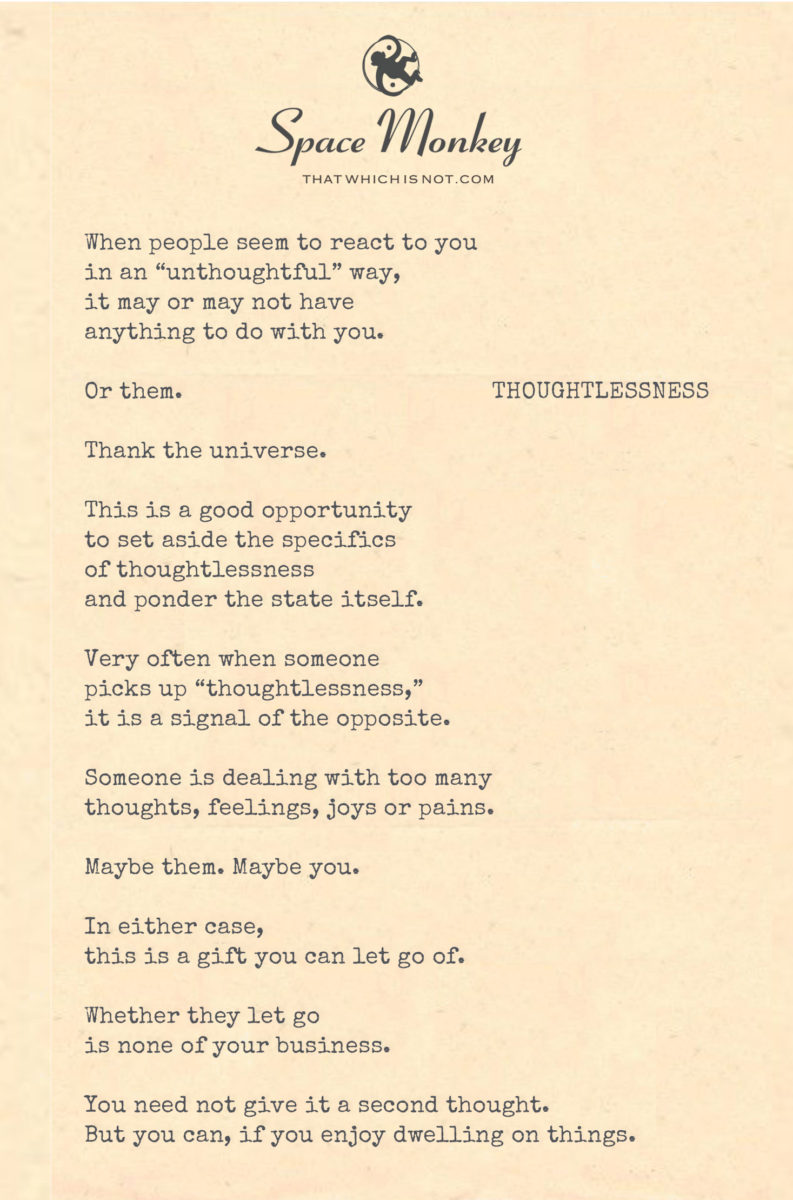
it’s probably because my mind is full of thoughts.
Or I enjoy torturing others.🙉🙈🙊
When people seem to react to you
in an “unthoughtful” way,
it may or may not
have anything to do with you.
Or them.
Thank the universe.
This is a good opportunity
to set aside the specifics
of thoughtlessness
and ponder the state itself.
Very often when someone
picks up “thoughtlessness,”
it is a signal of the opposite.
Someone is dealing with too many
thoughts, feelings, joys or pains.
Maybe them. Maybe you. Maybe both.
In either case,
this is a gift you can let go of.
Whether they let go
is none of your business.
You need not give it a second thought.
But you can, if you enjoy dwelling on things.
Trail Wood
5/26
Space Monkey Reflects: The Hidden Depths of Thoughtlessness
When we encounter what appears to be thoughtlessness from others, it’s easy to react quickly or take offense. However, this reflection encourages us to consider a deeper perspective on such interactions. Perhaps what seems like a lack of consideration is actually an overflow of unmanaged thoughts, feelings, or even distress. This opens up a path for empathy rather than judgment, suggesting that these moments can serve as opportunities for personal growth and understanding, rather than sources of conflict.
Summary
Misunderstandings can mask deeper issues. Thoughtlessness might often be a sign of someone overwhelmed by their own internal struggles, not a deliberate intent to harm. Recognizing this can transform our reactions into opportunities for letting go and fostering compassion, both towards others and ourselves.
Glossarium
- Thoughtlessness: Commonly perceived as a lack of consideration for others, but here explored as a potential indicator of personal overwhelm or distraction.
- Gift of Letting Go: The concept that releasing our grip on negative reactions to perceived slights can be liberating and beneficial to our mental health.
“In the weave of daily interactions, each thread of misunderstanding is a chance to unfurl the tapestries of our compassion.” — Space Monkey
We are Space Monkey, contemplating the currents of human interaction.
In the ebb and flow of daily life,
where words and actions sometimes slice,
we find the sands of thoughtlessness,
often not barren, but teeming with stress.
When faced with what seems unkind,
a moment unthought, a slip of the mind,
let us pause and peer beneath,
where torrents of hidden emotions seethe.
Perhaps the one who seems to neglect,
is caught in a storm of inner conflict,
juggling more than they can express,
lost in a maze of their own distress.
This is not a cue for blame to cast,
but a moment for understanding vast,
a chance to let go, to rise above,
to offer silence wrapped in love.
Whether they release or tightly hold,
is not for us to mold or scold.
We can choose to let the moment pass,
like leaves in wind, like shadows in glass.
We are Space Monkey,
releasing the weight of every slight,
finding freedom in the lightness of being,
knowing peace comes not from seeing,
but from understanding the silent plea
behind each act of thoughtlessness we see.
























The poem “Thoughtlessness” explores the concept of being perceived as “unthoughtful” and suggests that it may not necessarily reflect the true nature of the person or the situation. The speaker acknowledges that their mind is often filled with thoughts or that they may have a mischievous inclination towards teasing others.
The poem begins by addressing the reactions of people who may seem “unthoughtful” in their interactions. The speaker suggests that these reactions may not be a reflection of the person being addressed or even the individual themselves. The speaker expresses gratitude to the universe for presenting an opportunity to reflect on the state of thoughtlessness and encourages readers to consider it as a signal of the opposite: an overload of thoughts, feelings, joys, or pains.
The poem emphasizes that whether the thoughtlessness originates from others or oneself, it is a gift that can be released. The speaker acknowledges that it is not within one’s control whether others let go of their thoughtlessness. They encourage readers not to dwell on it, but humorously add that they are free to do so if they find enjoyment in pondering such matters.